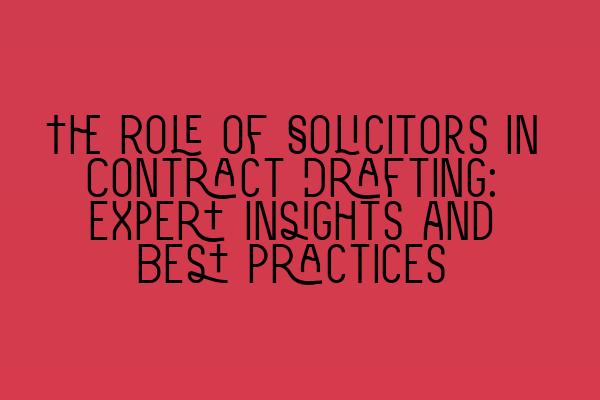The Role of Solicitors in Contract Drafting: Expert Insights and Best Practices
Contracts are the backbone of business relationships, serving as formal agreements that outline the rights and obligations of parties involved. It is the responsibility of solicitors to ensure that these contracts are meticulously drafted, legally sound, and tailored to the unique needs of their clients. Effective contract drafting not only protects the interests of the parties involved but also helps to minimize future disputes and legal complications.
In this article, we will delve into the role of solicitors in contract drafting, providing expert insights and best practices to help you understand the importance of having a skilled solicitor by your side when dealing with contracts. We will cover topics such as the key responsibilities of solicitors in contract drafting, the importance of legal expertise, common pitfalls to avoid, and strategies for effective contract drafting.
The Key Responsibilities of Solicitors in Contract Drafting
Solicitors play a crucial role in contract drafting, acting as legal advisors and advocates for their clients. Their responsibilities include:
- Analyzing client needs: Solicitors begin the contract drafting process by thoroughly understanding their client’s objectives, requirements, and concerns. This ensures that the contract addresses all critical aspects and adequately protects their client’s interests.
- Identifying potential risks: A skilled solicitor has the expertise to foresee potential risks and pitfalls in a contract. They conduct a thorough legal analysis, identifying any potential loopholes, ambiguities, or clauses that may be disadvantageous to their client.
- Drafting clear and precise terms: Solicitors have the task of drafting legally binding terms that are clear, concise, and unambiguous. They use their extensive legal knowledge to ensure that the language used in the contract effectively conveys the intentions of the parties involved.
- Negotiating and facilitating agreements: Solicitors often act as mediators, helping parties reach mutually beneficial agreements. They drive the negotiation process, ensuring that their client’s interests are protected and that the final contract reflects their client’s objectives.
- Ensuring compliance with legal requirements: Solicitors must ensure that the contract complies with all relevant laws, regulations, and legal principles. They keep up to date with changes in legislation to ensure that the contracts they draft are always legally sound.
The Importance of Legal Expertise in Contract Drafting
Contract drafting requires a deep understanding of various areas of law, including contract law, corporate law, intellectual property, employment law, and more, depending on the nature of the contract. An experienced solicitor brings invaluable legal expertise to the table, ensuring that the contract is robust and legally enforceable.
Legal expertise allows solicitors to:
- Identify potential legal pitfalls and address them before they become costly legal disputes.
- Create contracts that are compliant with relevant regulations and industry standards, reducing the risk of non-compliance.
- Apply legal principles to protect their client’s rights and interests in the event of a breach or dispute.
By leveraging their legal expertise, solicitors provide their clients with the peace of mind that comes from knowing they are entering into contracts that are solid and secure.
Common Pitfalls to Avoid in Contract Drafting
Contract drafting is a complex process that requires meticulous attention to detail. Even the smallest oversight or ambiguous wording can have serious consequences. Here are some common pitfalls to avoid:
- Ambiguity: Contracts should be drafted in a manner that leaves no room for interpretation or ambiguity. Clear and precise language is essential to prevent potential disputes.
- Failure to address contingencies: A well-drafted contract should anticipate potential future scenarios and include provisions for unforeseen events or changes in circumstances.
- Insufficient consideration of risks: Identifying and addressing potential risks is crucial. Failure to do so can leave parties vulnerable to financial losses or legal complications.
By working closely with a solicitor who is well-versed in contract drafting, you can avoid these pitfalls and ensure that your contracts are comprehensive, enforceable, and protect your interests.
Strategies for Effective Contract Drafting
To enhance the effectiveness of your contract drafting process, consider the following strategies:
- Thoroughly understand client objectives: Take the time to understand your client’s goals and expectations. This understanding allows you to tailor the contract to their specific needs and objectives.
- Be proactive in risk assessment: Identify potential risks and liabilities before they become problems. Conduct a comprehensive legal analysis and address any weaknesses or loopholes in the contract.
- Use clear and precise language: Ensure that the language used in the contract is easily understood by all parties involved. Avoid using legal jargon or complex terminology that may lead to confusion or misinterpretation.
- Stay informed about changes in law: Continuously update your knowledge regarding changes in relevant legislation and industry standards. This helps ensure that the contracts you draft are always up to date and legally compliant.
- Consider future contingencies: Anticipate potential future scenarios and build flexibility into the contract. Including provisions that address possible changes in circumstances can help prevent disputes down the line.
By following these strategies, you can enhance the effectiveness of your contract drafting process and ensure that your contracts are robust, comprehensive, and legally sound.
In conclusion, solicitors play a vital role in contract drafting, providing expert guidance and legal expertise to ensure that contracts are sound, clear, and tailored to clients’ needs. By understanding their key responsibilities, leveraging legal expertise, avoiding common pitfalls, and employing effective strategies, solicitors help their clients enter into contracts that protect their interests and minimize the risk of legal disputes.
If you’re interested in learning more about the legal profession and expanding your knowledge in related areas, we recommend checking out the following articles:
